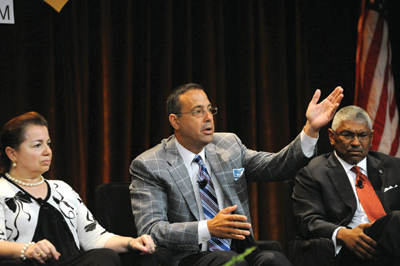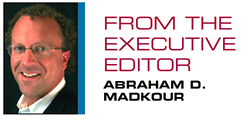Perhaps Indianapolis is listening to its members.
It is good to hear that NCAA President Mark Emmert will form a council of 10 athletic directors who will meet regularly with him and his senior staff starting next month. This is a much-needed move coming from the NCAA offices, as I’ve heard repeated frustration from ADs who feel left out of the communication and decision-making process affecting their roles and responsibilities.
Starting with Emmert’s much-publicized presidential retreat in August 2011, there has been a shift away from the participation and input of ADs, a move that seems misguided. But over the last few months, there have been signs that the frustration of ADs is at least being heard. There was a private breakfast during the Final Four in Atlanta where Emmert spoke of a need to re-engage practitioners who had been marginalized. Privately, many in the room were skeptical, but a group was proactive in following up with the NCAA president about what type of suggestions and feedback he was open to, and that was followed by Emmert announcing plans for the new council at the NACDA Convention in Orlando earlier this month. This is a positive first step that should facilitate immediate interaction, and it comes after two panels at NACDA endorsed greater AD involvement within the NCAA inner sanctum.
“When there are issues in college athletics, and you bring 50 presidents together to talk about the issues in college athletics — and don’t have enough involvement with the athletic directors in those conversations — I think you miss some things that are critical to the conversation,” said Georgetown AD Lee Reed. “We need to come together as a group and discuss these issues, because right now, it’s happening in silos, it’s happening in leagues, and there is no cross-pollination and there is no conversation. It’s really a lack of leadership of our group in terms of where we are headed. … We have to be more involved in the process.”
Duke AD Kevin White concurred. “If there was an AD on the executive team in Indianapolis,” he said, “that would be really helpful. That person could then interpret the campus to Indianapolis and, conversely, interpret Indianapolis back to everybody in this room.” He then spoke of the frustrations among many ADs with the current system. “Our profession is in earnest and is working really hard to take it to the next level,” White said. “But at this point, I don’t think we have a blueprint in place. We are a little bit lost, and that is where the consternation, if not the frustration, comes from. If we had someone in on that executive team, on that senior team, that understood the landscape [of athletics on campus] on a day-to-day basis, it would be incredibly helpful. And we haven’t had that, quite frankly, really since Cedric Dempsey [ran the NCAA from 1994-2003].” He noted the benefits of having an AD in the room at Indianapolis. “Interpreting what we all do, every day, the reality of running an athletics department,” he said. “What does it look like? If you haven’t been on a campus, I don’t think you really know.”
During an earlier panel, Yahoo Sports college reporter Dan Wetzel said the initial move for more presidential control of athletics “was done with good intentions,” but it hasn’t worked. “You see it in the backlash now,” he said, “from presidents saying, ‘We’re not equipped to handle this; we’re losing our jobs over things we are not capable of dealing with.’” USA Today college reporter Dan Wolken agreed. “Sports have turned college presidents into pseudo-celebrities,” Wolken said. “I don’t think that’s productive for their campuses. Sports is an important part of what they deal with every day on campus, but it seems to overwhelm them when they get into a crisis.” Both agreed ADs need to have a stronger voice. “Athletic directors who are on the ground, every day, who understand the issues, who understand what student athletes deal with, they need to have a voice,” Wolken said.
The AD council created by Emmert is not a decision-making panel, so it bears watching how it develops. But it’s a positive step that seems to continue the recent effort by the NCAA president to listen to the executives who are “on the tarmac” of today’s college campus. It’s a start.
> GRADING THE PRESIDENT: Emmert’s tenure and leadership was the focus of a discussion by Wetzel, Wolken and ESPN’s Jay Bilas, who has been very critical of Emmert in the past year, especially in the area of enforcement. Bilas said Emmert “has done some good things,” but he added, “Any leader should be expected to run his own office well, and I don’t think that’s happened. I think there have been some significant mistakes made. I think he talks too much. I think enforcement is a gigantic problem that the NCAA has, and will continue to have, until the structure is changed.”
Bilas called for an “attitude” adjustment in Indianapolis and noted Emmert’s State of the NCAA press conference during the Final Four, when he confronted members of the media who called for his resignation, saying, “All you have to do is keep your cool for 45 minutes, and he decided to go after reporters that called for his job. … I didn’t think that was befitting of a leader in that position.”
Wetzel noted surprise that Emmert hasn’t been able to deliver on his agenda. “He’s done a good job with certain reform. He’s certainly trying to be ambitious,” Wetzel said. “But it’s obviously being shot down dramatically back at him, and one of the reasons you hire a university president to be president of the NCAA is, presumably, he would know that road map a little bit better.”
Wolken also noted a lack of political capital. “Emmert’s ideas have never been bad,” Wolken said. “The problem is, if you’re going to undertake such a broad and aggressive agenda as he tried to undertake, you have to have credibility and control in the legislative process as you try to push your reforms through.” Asked if Emmert can get his agenda back on track, Wetzel sounded doubtful. “He’s a smart guy, he means well, but I don’t think there’s a will to change,” he said. “What needs to happen is dramatic change, and I don’t think there’s any interest in dramatic change out there.”
 |
At NACDA, DePaul’s Ponsetto, TCU’s Del Conte and Georgetown’s Reed
Photo by: JOAN TIEFEL
|
> A LOSS OF COLLEGIALITY? The size and scope of today’s college programs and the challenges of such were clearly evident on the panel of ADs, where differences of opinion were common on everything from possible stipends to governance. DePaul’s
Jean Lenti Ponsetto came out strongly against the current governance structure. “We definitely lost our way when we went away from one institution and one vote,” she said. “One of the unintended consequences of that is that we don’t really know who our future and next generation of leaders [is] going to be. … [Before], you would go to the NCAA Convention, people would speak about different issues, and we would learn all type of things from each other, and there was a sense of collegiality amongst us that doesn’t exist anymore. We don’t have that sense of collegiality because we don’t have the opportunity to spend enough time with each other outside of our conferences.” She said that has prevented the full organization and membership the opportunity “to vet issues, to hear differences of opinions. … There was a greater appreciation for what everybody went through.” She concluded, “We have got into this self-serving mode right now that has been very harmful and very damaging to what it is we are trying to do.” She said the NCAA would benefit by a system “where we have lots of voices, and presidents get to hear the rationale and the vetting about why certain legislation may be good, and other legislation may not be good, for the enterprise.”
But TCU’s Chris Del Conte suggested the economics on campus have changed so drastically that it’s not realistic anymore. “We have presidents saying, ‘Hey, I’m not going to be told what to do by Bowling Green. My program is here, and here is where we are headed,’” Del Conte stressed. “I just don’t see us going back. That’s part of our problem. You can’t run the big, global body and expect everyone to be happy.”
Abraham D. Madkour can be reached at amadkour@sportsbusinessjournal.com.





